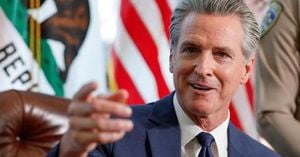David A. Lebryk, the top-ranking official of the U.S. Treasury Department, is set to resign amid significant turmoil following his clashes with Elon Musk’s allies over access to sensitive government payment systems. This crestfallen announcement marks the exit of one of the longest-serving career officials within the department, who has been instrumental for decades under various administrations.
According to The Washington Post, Lebryk’s dismissive interactions with representatives from Musk’s newly established Department of Government Efficiency (DOGE) led to his decision, impacting the agency's future management during this uncertain political climate. Since the 2020 election and continuing through Trump's administration, Musk’s DOGE team has sought access to the Treasury's vast payment systems which are responsible for disbursing over $6 trillion yearly, covering Social Security and Medicare benefits, federal salaries, contract payments, and tax refunds.
Lebryk, who joined the Treasury as an intern back in 1989, highlighted his career through pivotal moments, including leading efforts to roll out stimulus payments amid the COVID-19 pandemic. His extensive tenure earned him respect across the political spectrum, making his departure particularly alarming. Michael Faulkender, the current Deputy Treasury Secretary, stated, "I could not, to this day, tell you his politics," reflecting the nonpartisan service of Lebryk throughout his career.
The sensitive nature of the requested access raises concerns among many, as historically, only selected officials have managed these systems due to the immense responsibility involved. The Bureau of Fiscal Service operates these mechanisms, employing stringent measures to secure federal funds. Former senior Treasury official Mark Mazur emphasized the mechanical nature of this work, saying, "This is a mechanical job — they pay Social Security benefits, they pay vendors, whatever. It’s not one where there’s a role for nonmechanical things. Your whole job is to pay the bills as they’re due." This cautious approach has been fundamental to maintaining integrity within the governmental operations.
Despite their persisting attempts at procurement of system access, Musk’s intentions remain ambiguous, initiating speculation about potential underlying motivations to influence federal expenditures. Politically charged claims argue Musk may be overshadowing institutional governance, evoking reactions among Trump’s closest aides. Reports revealed considerable frustration among White House staff members, particularly after Musk criticized substantial investments the administration proposed, indicating unrest and discord in the communication between Musk and the Trump administration.
The resignation of Lebryk can also be viewed as symptomatic of broader systemic issues. Emerging from this clash are dramatic undercurrents questioning the appropriateness of private-sector interests encroaching upon established governmental protocols. While advocates of efficiency might cheer for fresh approaches to bureaucracy, critics caution against compromising the safeguards needed to regulate sensitive fiscal mechanisms.
Lebryk's departure, alongside the backdrop of Musk's entangled authority, paints a disconcerting picture of possible instability. Observers worriedly note, "If federal officials who have served for decades under different presidents see the need to quit, that's not promising for the country." The immediate fallout may resonate beyond the confines of the Treasury, compelling the reassessment of who should control the purse strings of the U.S. government amid growing public scrutiny of potential conflicts of interest.
Moving forward, the fate of these payment systems and access permissions will undoubtedly develop as the Senate has just confirmed Scott Bessent to assume the new Treasury Secretary role, tasked with steering the department's future direction. With Lebryk's extensive expertise departing, the upcoming management will face immense scrutiny as they navigate the new executive dynamics layered with private influences. Observers are left questioning how the intersection between private innovation and government processes can be efficiently harmonized without sacrificing institutional integrity.
The resignation of such a seasoned bureaucrat raises alarm bells and leads to grappling questions about government transparency, accountability, and the ramifications of intertwining commercial interests with federal operations. Amidst this transitioning period, it will become increasingly significant for stakeholders to honor the boundaries delineated for professional civil service, lest we tread dangerously close to conflated responsibilities.



